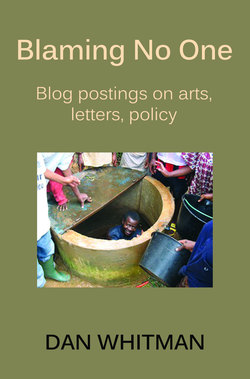Читать книгу Blaming No One - Dan Inc. Whitman - Страница 15
На сайте Литреса книга снята с продажи.
Why is This Man Smiling? June 4, 2011
ОглавлениеWe call him Sami; he’s our friend in Foggy Bottom. On the good days, he pulls his coffee wagon, trailing behind his car, to the curb at 2100 Virginia Avenue NW, aka “State Annex 3,” which sounds like an intergalactic science fiction space vessel.
On Commonwealth Avenue, Boston, in the 1970s, he would have been pushed along out of the way by BU’s President Silber. In the Foggy Bottom of today, our national and international bureaucracies know him as a source of light in the penumbra of cubicles and hierarchies of the neighborhood.
Actually he is Musie Tedla, and lives across the bridge in suburban Virginia with his wife and two children. He’s from the Horn of Africa, but doesn’t get into the particulars of his exact provenance. He never had any dog in the fights of the region. When you ask how long he’s been in the U.S., he says only, “Many years.”
Wedged between the Pan American Health Organization (PAHO), the State Department, and a spur of the campus of George Washington University, Sami knows our sidewalk is a good location. Some call the Avenue “Bucharest,” because the wide street never developed much traffic to match its expansive girth.
Bureaucrats live atomized lives, but were probably meant to live in villages, like all people. Comunitas gets lost as organizations grow too big. In bureaucracies, messages reach the members through ciphers on a screen. People need tam-tams and musical beats in their lives. They become grumpy without them, like circus animals dressed in tuxedos for the crowd.
WETA music (Schubert, Haydn, de Falla, Villa-Lobos, Ravel...) comes softly out of Sami’s little radio from the coffee wagon in the morning. He loves European music. He won’t say no if you offer him concert tickets. He’ll show up at the concert with his 12-year-old daughter.
People like his smile and hospitality. If you say your name he’ll remember it – not to “develop a clientele,” but because he has a connection with people. If he hasn’t seen you in some weeks, he wants to know where you’ve been, or if you’ve traveled.
Anyone wants their half minute with Sami to share the news of the day. If you order the same brew a few times, he will usually say something like, “Caramel chocolate skim macchiato, Ted? Two sugars, then?”
Sometimes the customers don’t have all that much in common, especially the PAHO people whose bureaucracy is a mystery to the State Department majority in the neighborhood. But they get in line mainly for the same reasons. The cravings seem to be our equalizer. Weird characters do shuffle along the sidewalk, some of them scary, hearing voices and talking back. They, too, are included if they want to be.
Many say Sami’s coffee is the best in Washington. That could be just pride of place. Anyway, we’d probably do the ritual even if it weren’t. People will act human if given the chance. It isn’t easy when we’ve over-organized ourselves. The organizations get the “they,” and the “we” mixed up.
Maybe I’ve overstated it: people love the wagon, the coffee, even the ten minutes they spend in line waiting. Sami’s wrists know when the pour reaches just above the brim of the paper cup, I don’t know how he always gets it right. People’s minutes there fortify them for the day, even as the cubicles suck the humanity out.
He works when he’s in the mood, and wraps up shop around lunch time or when supplies are down. People who park their cars underground sometimes start the day upstairs by asking around in the office, “Is Sami out there today?” If not, a momentary craving goes unattended and the mood gets soggy. Regardless, people know he’ll show up again in a day or two.
When bureaucratic disputes put out toxins in the air, one reliable conflict resolution device at 2100 Virginia Avenue is to say “Let’s see if Sami is out there.” Those whose style is to walk away from disputes rather than confront them (Type Whatever in the Myers-Briggs test) sneak off for a moment at the coffee wagon. They may just find their antagonists in line for the same reason. The previous harmonies, if any, get reset.
I asked Sami if he had long range plans or wishes. He nodded across the avenue to the D Street entrance of the State Department across the way. The D Street entrance was temporarily blocked for repairs in 2008, and should be reopened in 2012 or 2013. It’s really just a door.
Sami said, “I’d just like to serve coffee to everyone in that building over there. Actually, I like coffee.”
